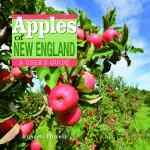PEOPLE MAY DIFFER on how to pronounce it, but there is nearly universal agreement that Macoun is one of the best tasting apples. Whether you say “Mac-cow-n” or “Mac-coo-n,” the apple named for Canadian pomologist W. T. Macoun is renowned for its crispness and sweet-tart flavor.
Macoun is a cross of McIntosh with the heirloom apple Jersey Black. Also called Black Apple because of its deep color, Jersey Black supplies Macoun’s rich, wine-red tones, with occasional green patches or stripes.
Macoun is a tactile pleasure, as pleasing to hold as it is to behold. Its irregular, boxy shape — another feature of Jersey Black — fits easily into the hand. Its light green flesh is crisp and juicy.
McIntosh supplies much of Macoun’s juiciness and flavor, which is more tart than sweet. But Macoun’s texture is firmer than McIntosh, and it has a distinctive, complex spiciness, with a hint of strawberry.
New England Macouns are ripe now at most orchards, and they should be available at farm stands and in stores for several months, while supplies last. For a long time Macoun was considered strictly a fall apple, which heightened anticipation of its arrival. Much of that anticipation remains today, and despite improvements in storage, demand for fresh Macouns remains strong.
Macoun is such a great fresh-eating apple that it is often overlooked for cooking. It can get a little juicy when cooked, but its flavor and firmness work well in pies, crisp, and sauce, especially in combination with other varieties.
As for pronunciation, there is no definitive answer. Descendants of W. T. Macoun pronounced the family name “Mac-cow-n,” but some dictionaries assert that it is “Mac-coo-n,” instead. The disparity over pronunciation undoubtedly has its origins among clans in the United Kingdom, long before the discovery of the Macoun apple in New York in 1909. It was released commercially in 1923.
Over time, both pronunciations generally have been accepted, and their usage now varies some from region to region, even orchard to orchard.
Named in honor of the apple scientist William Tyrell Macoun, in our opinion the “Mac-cow-n” affirmed by his descendants seems like the obvious name for this stellar treat.
But once you sink your teeth into a fresh Macoun, what you call it is irrelevant.
*
TWO BOOKS by Russell Steven Powell, senior writer, and Bar Lois Weeks, executive director of the New England Apple Association, explore the history of apple growing in the region and look at the nation’s apple industry.
 Apples of New England (Countryman Press) is an indispensable resource for anyone searching for apples in New England orchards, farm stands, or grocery stores — or trying to identify an apple tree in their own backyard.
Apples of New England (Countryman Press) is an indispensable resource for anyone searching for apples in New England orchards, farm stands, or grocery stores — or trying to identify an apple tree in their own backyard.
The book contains color photographs by Weeks and descriptions of more than 200 apples discovered, grown, or sold in New England, accompanied by notes about flavor and texture, history, ripening time, storage quality, and best use. Apples of New England offers practical advice about rare heirlooms and newly discovered apples.
Apples of New England includes chapters on the rich tradition of apple growing in New England, and on the “fathers” of American apples, Massachusetts natives John Chapman (“Johnny Appleseed”) and Henry David Thoreau. Apples of New England presents the apple in all its splendor: as a biological wonder, as a super food, as a work of art, and as a cultural icon.
 America’s Apple (Brook Hollow Press) tells a rich and detailed story about apple growing in America, from horticulture to history to culinary uses. Powell writes about the best ways to eat, drink, and cook with apples. He describes the orchard’s beauty and introduces readers to some of the family farms where apples are grown today, many of them spanning generations.
America’s Apple (Brook Hollow Press) tells a rich and detailed story about apple growing in America, from horticulture to history to culinary uses. Powell writes about the best ways to eat, drink, and cook with apples. He describes the orchard’s beauty and introduces readers to some of the family farms where apples are grown today, many of them spanning generations.
America’s Apple looks at how America’s orchards are changing as a result of the trend toward intensive planting and the trademarking of new varieties, and what that means to consumers. Powell also writes about the fragile underpinnings of modern agriculture: the honeybees needed to pollinate the crop and the labor required to pick it, plus new and exotic pests and increasingly volatile weather.
Apples of New England and America’s Apple are available in hardcover at fine bookstores and orchards and online. America’s Apple is also available in paperback.
For more information, write to newenglandapples@verizon.net.